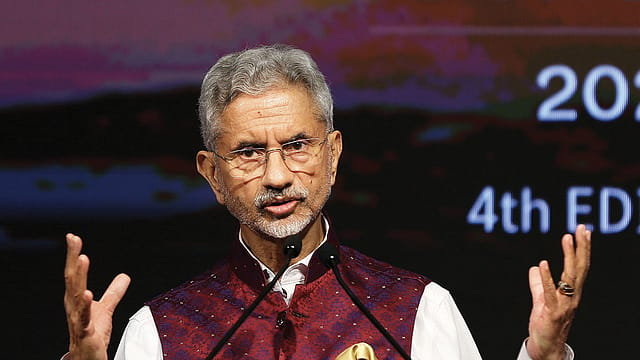Taking the Pragmatic Route

THE THEME OF India’s options in a turbulent world dominated the address by External Affairs Minister S Jaishankar when he addressed the conclave on October 5. His remarks had a thematic overlap with what Finance Minister Nirmala Sitharaman had said earlier. While Sitharaman couched the issue in terms of making India resilient, Jaishankar described this as boosting India’s comprehensive national power. The issues of multipolarity, India-US relations and alternative groupings to further multipolarity flowed from his remarks and his responses to various questions in the session.
For Jaishankar, the core element of what India ought to do is building up its capabilities. In his speech, he said, “When I see a proposal to deepen manufacturing, when I look at a mission to actually promote advanced manufacturing, semiconductors, for example, or electric vehicles or drones or space, when I look at a project or a set of projects or policies which would take forward infrastructure or which focus on human resources and skills… I want to say from my vantage point, every bit of this actually adds to our comprehensive national power and helps me actually to deal with these turbulent times.”
“That for India, in many ways, the answer for a more difficult world is not just outside. A large part of that answer is inside. That if we can get our human resources better developed, if we can get our infrastructure moving faster, if we can get manufacturing to deepen more, if we can get new trade flows, because I think given the volatility, the uncertainty that we have seen this year, it is very clear that there is a very strong case really to diversify further the trade account as well.”
These issues were elaborated in the panel discussion after he made his remarks. The session, moderated by NK Singh, tackled an interesting set of questions that have been debated since Donald Trump became US president for the second time this year.
Openomics 2026: Continuity and Conviction
06 Feb 2026 - Vol 04 | Issue 57
The performance state at its peak
Singh asked whether multipolarity was a reality and if it was an answer to effective international relationships. In response, Jaishankar said, “Multipolarity is partly happening but multipolarity partly has to be built.” He added that while multipolarity sounded like a “neat quantitative description”, in reality it was more complicated and some countries in different regions took the lead. The world was partly fragmenting, “multiplying” and decaying at the same time. “It is going to be a longish, messy, twilight zone with many things happening in many regions, often contradictory to each other.” About India-US relations, Jaishankar acknowledged that ties had hit a rough patch. At the same time, he cautioned against viewing the situation as damaged beyond repair. He said, “Yes, today we have issues with the US. A big part of it is that we have not arrived at a landing ground for our trade discussions. The inability, so far, to reach there has led to certain tariffs being levied on India.” The minister then outlined the irrationality of the American actions on the issue of energy purchases from Russia. “I am not minimising the issues but I don’t think we should take it to a point as though this is going to percolate every dimension of the relationship and that there is something very fundamental at stake. I think we need to see this in proportion,” he said.
On the future of the Quad grouping, the minister said, “It is a bureaucratic structure” and that it continued its routine work where different people continue to engage with each other. He noted that since the start of Trump’s second term, the Quad had met twice, in January—soon after Trump took office—and in July. He said with a smile, “The Quad is alive and the Quad is well.”
The question of energy choices exercised by different countries led to an animated discussion. In his remarks, Jaishankar had noted how the US was championing fossil fuels and China had become a leader in renewable energy sources. This led to the question whether economics and market mechanisms would settle the issue of energy choices. Jaishankar had a different opinion. He noted, “You could argue that when you have price caps on energy, when you have sanctions on energy, when you have subsidies on renewables… I am kind of wondering where is the market economics in all of this?” He went on to add that in a world where “the central consideration of trade has become tariffs… please explain to me where competitive advantages and competitiveness go?”
His conclusion that it is not just the basics of politics that are being revisited but the basics of economics, too, are being revised has a broad resonance from the Indian perspective.
